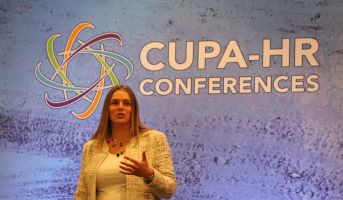Living Our Values: Courage, Care and Calling at CUPA-HR’s Spring Conference
 “Wherever we go, we are CUPA-HR.” That’s what CUPA-HR President Andy Brantley reminded members at the recent Spring Conference in Minneapolis. Though institutions differ in mission and scope and despite daily crises that threaten to divert attention from long-term goals, CUPA-HR members live their values every day.
“Wherever we go, we are CUPA-HR.” That’s what CUPA-HR President Andy Brantley reminded members at the recent Spring Conference in Minneapolis. Though institutions differ in mission and scope and despite daily crises that threaten to divert attention from long-term goals, CUPA-HR members live their values every day.
The keynote speakers struck a similar theme, encouraging attendees to align their internal values with work, tapping into courage, care and a sense of calling.
The Courage to Embrace Failure
In her opening keynote, Kris McGuigan, an author, executive coach and corporate trainer, emphasized the power of authenticity in helping to overcome fear. At some point in our lives, we have all allowed our fears — including of failure, inadequacy and uncertainty — to dictate our future. “How often do we identify that a path is not serving us, but we stay the course, we cling to the status quo?” But clinging to the status quo out of fear can lead to apathy and disengagement. This lack of motivation and confidence can be tied to the engagement crisis at work.
Facing Down Fear of Failure
McGuigan believes courageously embracing failure can help move employees past apathy and disengagement. One way to start embracing failure is by taking a cue from tech. In their relentless testing and pushing out new releases, tech adopts a model of “perpetual beta.” This allows for constant innovation, with failure built into the model. If something doesn’t work, it’s scrapped and fixed — think of your smart phone’s frequent software updates. McGuigan asked, how can higher ed leaders bring this model of embracing failure to their teams?
Takeaway: Having the courage to embrace failure can increase engagement and satisfaction and decrease apathy and disengagement.
Creating a Caring Campus
In his keynote, Dr. Kevin R. McClure, Murphy distinguished scholar of education and associate professor of higher education at the University of North Carolina Wilmington, drew from his forthcoming book, The Caring University, for which he interviewed staff, faculty and administrators. What he found will likely sound familiar. Higher ed employees were working tirelessly and generously, and frequently sacrificed their physical and mental health for their jobs. Consistent with CUPA-HR’s findings, McClure cited higher ed employees’ primary concerns as overwork, inadequate compensation, lack of recognition for their contributions, and lack of career pathways, among others.

The Work “Just Kept Coming”
McClure interviewed one higher ed staff member who said the work “just kept coming.” Her campus leaders talked about care, but there was no structural change to her workload, so she started looking for a new job. Many of his interviewees felt they were required to be superhuman — a worker without a body or personal life — who “exists only for the job.”
Structural changes are needed in policies and procedures, he emphasized. What happens when practices like service awards and merit pay reward only ideal workers and not real people, or when leave policies don’t account for people’s caregiving or health needs? Employees will disengage and look for jobs elsewhere. HR has a crucial role to play in transforming the workforce, he says, and institutions need to empower HR as experts.
Takeaway: Structural change is urgently needed to transform higher education into a workplace that values the well-being of its employees.
Living your Calling Through Job Crafting
In the closing keynote, Dr. Amy Wrzesniewski shared insights into what makes work meaningful for the individual. In her research, Wrzesniewski, who is William and Jacalyn Egan professor at the Wharton School of the University of Pennsylvania, identifies three main ways people understand their work: as a job, career or calling.

Out of these, it is people who see their work as a calling who are more satisfied with the work and with their lives, tending to be absent less and engaged more. So how do people come to treat their work as a calling? That’s where “job crafting” comes in.
Finding Purpose in Work
Wrzesniewski interviewed members of a cleaning crew in a university hospital. This work is often stigmatized as non-meaningful, but employees who found a calling in the work were engaged in job crafting, often doing a different job than their job description, while still completing their required duties. For example, one cleaning crew member said that she tailored the cleaning schedule around patients who might be sensitive to the smell of cleaning chemicals. She made a tangible difference in the lives of others, even though she risked getting written up for doing so.
Wrzesniewski argues job crafting has several benefits. It can increase satisfaction and commitment to the job, intensify happiness at work, boost job mobility, and even maintain or increase performance.
Takeaway: Job crafting — the practice of living out your values by making work your own — can help make a work a calling, not just a job.



